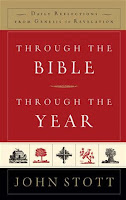Monday, October 22, 2012
Through the Bible, Week 8
When Everyone Did What Was Right In Their Own Eyes
Between the Exodus from Imperial Egypt and the reign of King David in a United Monarchy, lies a rugged terrain of partial conquest, enduring fratricide and an emerging but then full-blown anarchy in the land of Israel. Despite their experience of a totalitarian state, Israel continues to hanker for a king like the nations around them. After deliverance by Gideon, the men of Israel make a request; "Rule over us, you and your son and your grandson also, for you ahve saved us from the hand of Midian." And Gideon said to them, "I will not rule over you, nor will my son rule over you. But God will rule over you" (cf. Judges 8:22-26). Why do the children of Israel ask for a king when God has delivered them without one? We need not look very long in the book of Judges. There is a cycle of eight episodes characterized by deliverance from a political enemy, moral decline, apostasy and oppression - thus undoing everything the conquest was supposed to achieve. The people repent, call to God who delivers them through the agency of a "judge" (or charismatic leader) and the cycle begins afresh. Why does this keep happening? The narrator leaves nothing to the imagination. It is because the Judges rule in a time when everyone did what was right in their own eyes. The people of Israel subsequently conclude that they prefer a king to anarchy. It becomes apparent that the only alternative to anarchy is the establishment of a standing political and military power strong enough to maintain order internally and protect the people externally. They need a political state or kingdom. Thus, they desire a king to rule over them.
Generations later the scene is repeated during the judgeship of Samuel, who warns the people of Israel who continue to ask for a King: "This will be the custom of the king who will reign over you. He will take your son and post them for himself on his chariots, and to be his horsemen, to run before his chariot....He will take a tenth of your sheep, and you will become his servants [avadim]. And you will cry out on that day from before the king that you have chosen for yourselves, and the Lord will not answer you on that day" (cf. 1 Sam 8:11-18). When Samuel tells the people that if they establish a king they will all become his "servant" [avadim], he necessarily uses the same word that the Bible uses to describe the slaves of Pharaoh.
As much as the people initially hanker for radical autonomy (political anarchy), the verdict of biblical history is not for it. The reason is simple: it does not work as one might hope. This is another sign that people are no longer fit for Eden, even if Eden was provided to them. There is something unruly about the human condition which requires us to be accountable to the other. Indeed, it requires transformation. The book of Judges (and to a lesser degree Samuel) is one long indictment against anarchy, making it the pivot on which the biblical narrative turns from Empire to Monarchy. The people long for a king for they need a king, but not just any king. In the story of Saul and Solomon (which Samuel foreshadows above) we find that more is required of monarchy than simply a king. There must be king whose heart is turned toward God. Otherwise a monarchy will quickly slide either back toward empire or catapult into anarchy. A godly monarchy is a knife's edge, restraining anarchy on the one hand and resisting the pull towards empire on the other.
The beginnings of the messianic hope, the mandate of Jesus, find its origins in this political development. But the Bible reader will have to wait till the Gospels to witness its inauguration.
Subscribe to:
Post Comments (Atom)

No comments:
Post a Comment